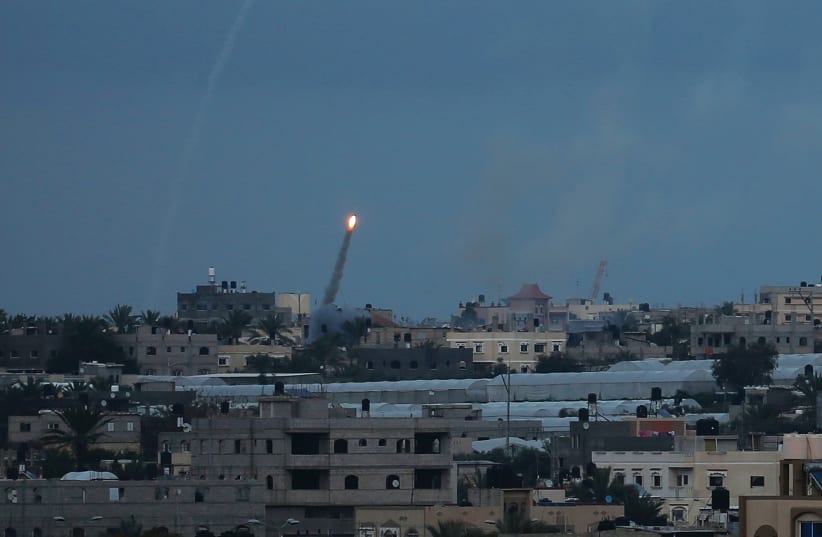Sderot Mayor Alon Davidi criticized Prime Minister Benjamin Netanyahu and Defense Minister Benny Gantz for the recent escalation on the Gaza border, Ynet reported Friday night.
"In a week when everyone is talking about 'peace in exchange for peace,' I cannot understand what world they are talking about," Davidi said late Friday, referring to Israel's recent establishment of official diplomatic ties with the United Arab Emirates.
Last Thursday, Netanyahu announced that the UAE had agreed to sign a peace accord with the State of Israel, normalizing diplomatic relationships.
"We are in war, struck by rockets and lacking basic security for our residents," he continued. Sirens sounded in Sderot and the surrounding Gaza border communities on Friday. A Qassam rocket launched toward the city was intercepted by the Iron Dome, according to the IDF.
Over the last several days, at least twelve rockets were fired from the Gaza Strip toward Gaza border communities. Launches also targeted the southern cities of Sderot and Ashkelon. While most rockets were intercepted, one projectile hit a house in Sderot, causing extensive damage.
According to Kan News, the rockets targeting the South over the past several days were launched by Hamas. Unlike previous cycles of violence, with Hamas turning a blind eye to smaller factions launching rockets, this wave of strikes was carried out by Izz a-Din al-Qassam, Hamas' military wing, KAN said.
The IDF has carried out a series of airstrikes in recent nights following the rocket fire, targeting Hamas posts in the Strip after at least 12 projectiles were launched into Israeli territory.
Incendiary and explosive balloons have also been launched toward the Gaza border communities in recent days, with at least 22 fires being caused by the arson devices on Friday alone.
An incendiary balloon was discovered Friday night on a rooftop in the South's main city of Beersheba, according to police. Earlier, an explosive device was found in the industrial park of the southern city of Kiryat Gat.
According to N12, the recent wave of escalation began with Hamas launching arson devices toward the South, pressuring Qatar to renew its cash grant to Gazan families.
Hamas's list of demands received by Egyptian intelligence Thursday included doubling the grant from an estimated $20 million to $40 million amid the humanitarian crisis in Gaza. According to the Hezbollah-affiliated Lebanese newspaper Al-Akhbar, Qatar agreed to renew the grant for another six months.
Responding to the balloons, the IDF struck Hamas posts and imposed new restrictions on Gaza, cutting off fuel supply to the coastal enclave and limiting the fishing zone off its coast.
According to Israel Hayom, Hamas's leader in Gaza, Yahya Sinwar, has used calculated, violent resistance in order to achieve economic independence from Israel, seeking to lift the blockade imposed after the terrorist group's takeover of the Strip in June 2007.
Several waves of rockets were fired toward the Gaza border following the IDF strikes. Five Israelis received medical care in Ashkelon's Barzilai Medical Center, three suffering from panic attacks and two who had sustained light injuries.
"You need to wake up. The residents of Sderot and the Gaza border communities are being pounded with rockets and are running to the shelters," Davidi said Friday, according to Ynet.
On Wednesday, Gantz warned the factions in the Gaza Strip against launching rockets and incendiary devices, suggesting the IDF would expand its targets and possibly resume targeted killings.
"We know how to target not only buildings and infrastructure, but also those who act from them," he said during a meeting with local regional authority leaders from the Gaza border communities.
Anna Ahronheim and Khaled Abu Toameh contributed to this report.
